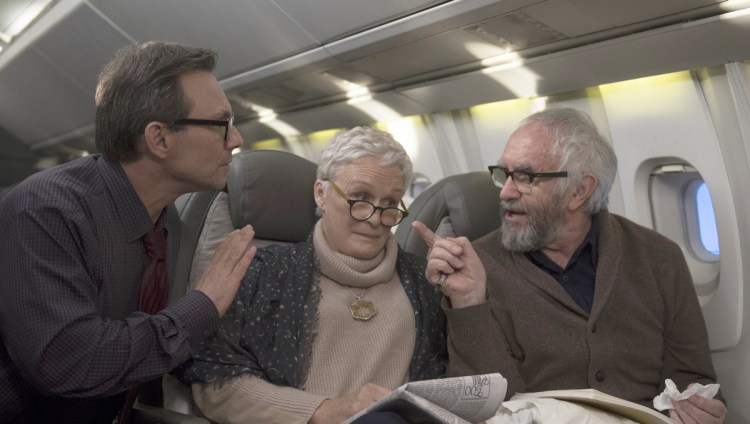They’re in bed, a writer and his wife. A phone call delivers the message they’ve both been waiting for. He has won the coveted Nobel Prize. They dance on the bed like teenagers, a dream has come true.
So here we are in Bjorn Runge’s splendid “The Wife,” written by Jane Anderson from the novel by Meg Wolitzer, that explores the old trope “Behind every great man there is a great woman.” I think that’s how it goes. Prepare to see it explained. Roll camera.
So Joan (Glenn Close) and Joe (Jonathan Pryce) begin their excellent adventure.
Soon he will appear on the famous stage and accept the dish of glory, the Nobel for literature; she will sit in the audience with what appears to most as pride, but there is something in the eyes.
Picture Pat Nixon standing next to Dick, Hillary next to Bill, Melania next to Donald, with those frozen expressions that hide earthshaking secrets. Are we on to something?
Do they share a secret, one that if exposed to the sunlight of social media, would burn a hole in their world, shatter the Nobel foundation itself? You betcha.
Joan sits in the Nobel Hall’s darkness, as Bjorn lets us watch her remembering young Joe, married with children, when he was her literature professor. She was his promising young student and then his girlfriend, and then his wife, after he abandoned his first wife for her. He becomes a full-time writer. We watch the pieces come together. Roll on.
His writing thereafter is a struggle, things look gloomy, but Joan steps in and clears his troubled pages, gives him tiny tips, and then stronger guidance. She freshens his plots, and blows life into what she chillingly calls his “wooden” characters.
His first book sells big, and then the next, and the next. He is Joe Castleman now, prize-winning, best-selling author. She is Mrs. Castleman, the woman in the corner at the parties, sipping her drink, and letting him sip the wine of wonder.
But smoke from the past begins to cloud the present. On the flight to Stockholm, Nathaniel Bone, (who else would play a character named Nathaniel Bone, but Christian Slater) a smarmy book critic/reporter comes to their seats, seeking an interview.
Joe brushes him off, Joan sniffs at him and sends him packing.
Bone will be back to have a drink with Joan in a Stockholm bar when Joe is out schmoozing with the literati. A threat is passed across the drinks. “Don’t treat me as the suffering wife,” she says, with that icy smile, “I’m much more interesting than that.”
That sentence chills Mr. Bone to silence and startles like a gunshot. Is this what we suspected about Joan and Joe and the whole hidden story? Roll on.
Director Runge has a short resume mostly in Europe, but is clearly in control of his medium here, given the giants he’s working with.
Much has to be said for Ulf Brantas’ camera, especially in the final scenes. He surely had his hands full.
Young Max Irons plays the winning couple’s son David, a frustrated and failing writer, suffocating in the smoky shadow of his father, and does it disturbingly well. The future is Iron’s friend.
Harry Lloyd is competent as the young Joe. Annie Starke (Close’s real daughter) is purely dazzling and wonderful as young Joan in flashbacks, and Alix Wilton Regan is impressive as her movie daughter.
But it’s Ms. Close who owns Runge’s movie, simply by standing still in each scene, with her Queen Elizabeth the First composure, fashionable snow white hair, and that Bette Davis style of handling a cigarette and drink at the same time. Ready for a cliché? She’s ready for her Oscar.
Jonathan Pryce is, of course, priceless in every role he takes. He is the master of the silent take, the long pause and saber thrust reply. In his final, shattering 10-minute scene with Close here, the screen shakes, the walls vibrate, and we remember that we are in the presence of greatness.
J.P. Devine, of Waterville, is a former stage and film actor.
Send questions/comments to the editors.



